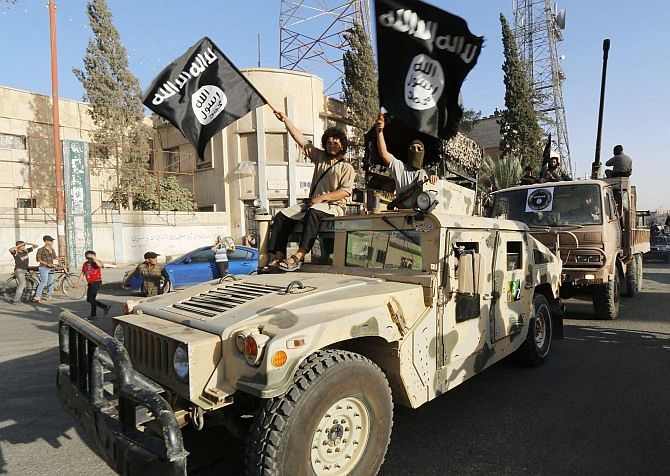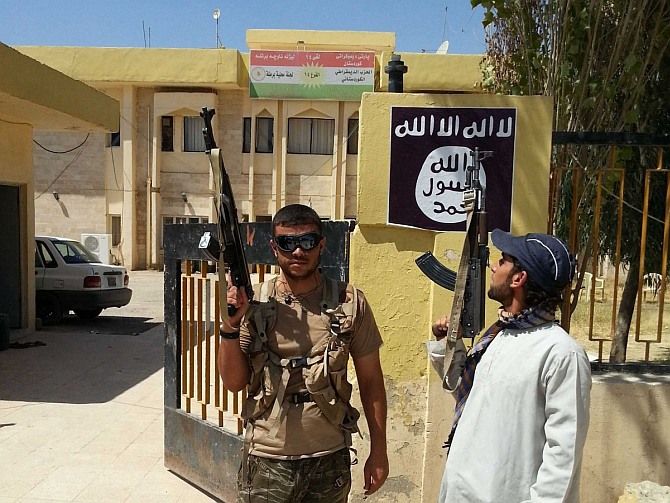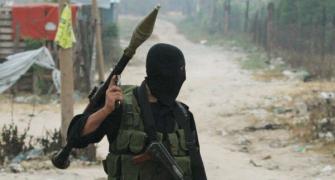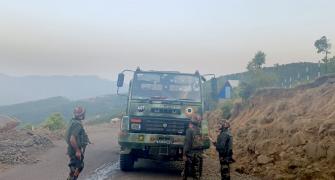United States President Barack Obama cannot avoid taking real action against the ISIS, says Claude Smadja.
The time is over when United States President Barack Obama thought he could afford to make a joke about the ISIS.
The jihadists claiming to have established the Islamic State are now the worst security threat ever for the Western world - but not only for it - surpassing by far whatever Al Qaeda represented at its peak, on 9/11 and after.
The militants of the ISIS, the so-called Islamic State of Iraq and Syria, are so hardline, and are demonstrating such a blind cruelty and ruthlessness, that they by far supplant what remains of Al Qaeda -- whose leader has, in fact, disavowed them.
They now control more than one-third of Syria and the same percentage of Iraq -- the centre and the northern part of the country -- eliminating the border between the two countries and declaring a "caliphate".
The ISIS forces have shown a remarkable fighting capability allied with a strong strategic acumen.
Furthermore, thanks to the exploitation of oil reserves on captured Syrian territory, the resources from looting and the huge ransoms exacted from kidnapping (which has become a very profitable industry), the ISIS has today a financial capability unequalled by any other terrorist group in modern history.
Much has been said and written on how the ISIS was allowed to develop such capabilities and achieve control of such a territorial base.
Quite clearly the narrow sectarian policies of the Maliki government in Baghdad -- and the frustrations and anger they created -- did a lot to rally a number of Iraqi Sunni groups around the extremist Sunni agenda of the ISIS.
The United States' inability to strengthen the moderate opposition to Bashar al-Assad, after President Obama had declared sternly that Assad should go, created a vacuum on the Syrian front that the ISIS was able to fill. And while Turkey and Qatar, on the one hand, supported and armed jihadist groups, Saudi Arabia and the United Arab Emirates on the other were supporting more moderate ones -- with the two camps competing for influence and, thus, creating propitious conditions for the ISIS to expand its reach.
Confronted with the very real risk that the ISIS forces would also take control of the Iraqi Kurdistan and then move against the Jordanian regime, President Obama has been obliged to act and authorise some air raids and some supply of weapons to the Kurds' peshmergas.
This remains, however, a very limited involvement. Apart from sending a small contingent to protect the large contingent of United States personnel in Baghdad, the president remains determined against having "boots on the ground"? again, and getting the United States sucked into a new war in Iraq.
The problem is that there is no way the ISIS can be stopped without a more significant military involvement from the United States.
The chairman of the joint chiefs of staff, Martin Dempsey, has also admitted that it might be necessary "to address the situation on both sides of what is now a non-existent border" (between Iraq and Syria) and with "a variety of instruments" beyond air strikes.
This does not truly address the quandary that Washington is now facing: on the one hand, there is now a recognition that, as General Dempsey said recently, the ISIS is "an organisation that has an apocalyptic, end-of-days, strategic vision which will eventually have to be defeated".
Secretary of State John Kerry was expressing the same recognition when he said that "ISIS must be destroyed". But on the other hand, the relatively limited means that the United States is ready to use are in no way sufficient to achieve the goal of "defeating" definitively the ISIS and "the imminent threat" that it represents.
The extent and nature of such a threat are not exaggerated. 
If the ISIS is able to pursue its advances in Syria and Iraq and then aim at Jordan, the whole West Asia-North Africa region risks going up in flames. This would be a drastic deterioration from an already disastrous situation, in which Iraq, Syria and Libya are in the throes of full-fledged civil wars, while Yemen is in absolute anarchy, the Jordanian regime is in a precarious situation and Egypt under President Abdel Fattah al-Sisi is in a fight to the finish with the Muslim Brotherhood.
Beyond the Arab world, the nature and intensity of the threat represented by the ISIS needs also to be fully understood. Contrary to a common assumption, the hatred of the jihadists, their desire to destroy the Western world, is not only generated by what the Western world does or doesn't do but -- for many of them -- by what this Western world is: the values, lifestyle and mindset it represents.
In that respect, it is extremely doubtful that there could be any actions or initiatives, any demonstration of intended goodwill that will make the hardcore jihadists change their mind and alter their goals.
So apart from a full-fledged Western military offensive -- not on the cards for the time being -- the only alternative for decisively defeating the ISIS and the extremist deviation of Islam that it represents rests with a coherent coalition of Arab regimes -- Saudi Arabia, the UAE and Egypt -- that would take up the challenge.
This would mean complementing military action from the forces of these countries -- as the raids that the Saudi and the UAE forces just did in Libya against Islamist groups -- with political initiatives to isolate the ISIS and its hardcore jihadists, to create the conditions and the incentives for the Sunnis in Iraq and Syria to reject its barbaric ideology.
This would not only necessitate much more active and determined support from Washington and London, and Paris and Berlin.
There would have to be a policy change from the part of the Saudi regime, which has been itself supporting and promoting outside its border an extreme brand of Islam as a way of buying peace with the Wahhabi clergy at home; this would involve that the monarchies of the Gulf find ways to meet the aspirations of their young people, to put in place economic policies aimed at promoting entrepreneurship and creating jobs instead of just benefitting mostly to a small coterie; this would also mean that the regime of President Al-Sisi demonstrates its ability to revive the Egyptian economy and to engage in genuine reforms and liberalisation instead of focusing on the maintenance of the Army's privileges and the repression of the Brotherhood.
Let's face it: the chances of these conditions being met are very limited. While a contribution from Arab regimes to addressing the ISIS threat is indispensable, it would be foolish to consider that it will be sufficient. Inaction, or too little action, will only help the Islamic State to expand its reach.
Obama and his European allies will presumably have to do much more. And soon.
The writer is president of Smadja & Smadja, a strategic advisory firm











